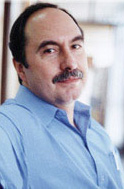Professor of Contemporary Latin American History
In 2012, a new initiative was undertaken to support the invitation of a professor of contemporary Latin American History to teach during one semester at the Graduate Institute. This was done in order to offer students the possibility of expanding their knowledge on the history of this continent.
In 2013, Julio Pinto Vallejos, Professor at Universidad Santiago de Chile, was the second holder of the Pierre du Bois Visiting Professorship in Contemporary Latin American History. He was at the Graduate Institute during the spring semester 2013.
Professor Pinto has an impressive academic background. He taught for thirty years at the History Department of the Universidad de Santiago de Chile, in the fields of 19th and 20th Century Latin America. He also has conducted courses on Chilean and World Contemporary Historiography, and on the uses of Social Theory in historical work. Professor Pinto is currently working on the social dimensions of state‐ and nation‐building in postindependent Chile, with special emphasis on the interaction between elites and subaltern groups. As a result of this research, Professor Pinto co‐authored a book with Verónica Valdivia titled “¿Chilenos todos? La construcción social de la nación, 1810‐1840“; and directed a collective work titled “El orden y la plebe. La construcción social del Estado en Chile y Argentina, 1829‐1852“. This last book does comparative research on the regimes led by Diego Portales in Chile and Juan Manuel de Rosas in Argentina.
The Graduate Institute was fortunate to benefit from his insights and expertise.
On March 19, 2013, he provided a public lecture entitled The Other 9/11: Forty Years After the Pinochet Coup in Chile
Courses Taught at the Graduate Institute
Populisms and Neopopulisms in Contemporary Latin America
See Course Syllabus
Profile
Universidad de Santiago de Chile
Areas of Expertise
- 19th and 20th-Century Latin America (especially social and labor history)
- State- and Nation-Building (especially Latin America, 19th Century)
- Historiographical Schools (20th Century)
- Applications of Social Theory to Historical Research
See his CV

